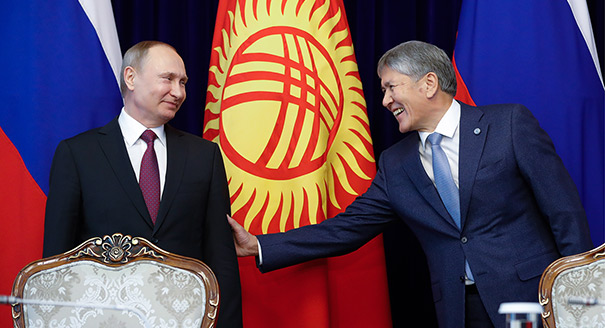Vladimir Putin’s recent tour of Central Asia was short but effective. Over the course of three days in Kazakhstan, Tajikistan, and Kyrgyzstan, at the end of last month, it was reported that Russia had made progress in enhancing border security along the southern border of the Commonwealth of Independent States (CIS) in order to halt the spread of terrorism in the region.
In the course of the rapid visit in which Putin travelled from February 26 to 28, between the Kazakh city of Almaty, and the Tajik and Kyrgyz capitals, Dushanbe, and Bishkek, the Russian president also made it clear how much benefit his hosts—and especially Kyrgyzstan’s president Almazbek Atambayev—derived from close collaboration with Moscow
On the eve of Putin’s visit, the authorities in Bishkek decided to arrest one of Kyrgyzstan’s best-known politicians, Omurbek Tekebayev, an opposition leader who is often known as the father of the country’s constitution. Tekebayev was charged with corruption and fraud for allegedly taking a $1 million bribe from Russian businessman and former State Duma MP Leonid Mayevsky in exchange for a stake in Kyrgyz telecom company MegaCom following the April 2010 Revolution.
Why is Tekebayev only now being prosecuted, seven years after the fact? Atambayev’s opponents say that the case is entirely politically motivated: Tekebayev had threatened to compromise the president by publishing an investigation into Atambayev’s offshore holdings and with Putin’s visit looming, Atambayev needed to show his Russian counterpart that no one is untouchable in his system.
Tekebayev was not jailed because he was a threat to Atambayev’s presidency, however. The Kyrgyz constitution bars Atambayev from running for another term, meaning the country will have a new executive leader come November. However, the Kyrgyz leader has said that he will “remain in politics” after the election, meaning that his choice of a successor is important.
Even more significant is the question of whether or not Putin supports this successor. Accordingly, when Atambayev is around Putin, he makes tough law-and-order statements such as “a thief should go to prison” to get approval from his Russian counterpart. The Kyrgyz president got the approbation he wanted after their most recent meeting: Putin praised Atambayev for “the process of democratic formation and the stabilization of the situation in the country.”
Indeed, Atambayev had every reason to be pleased with Putin’s trip. The Russian leader even invited him to Russia for a return visit. For a president who only has nine months left in office, this invitation looks like a promise to support whomever Atambayev chooses to be his successor.
Over the course of his visit, Putin made it clear that Kyrgyzstan remains fully reliant on Russia. Amongst other things, he noted that as a result of Kyrgyzstan’s accession to the EAEU, remittances from Kyrgyz laborers in Russia grew by 18.5 percent over nine months last year to $1.3 billion, or about one-third of Kyrgyzstan’s GDP.
Although the meetings were by and large a success, the Russian president did make several strange comments. Responding to a question about the possible expansion of the Russian air base in Kant, 26 kilometers from Bishkek, Putin reported that the base had been built “at the request of the Kyrgyz leadership in 1999–2000, when Kyrgyzstan was fighting international terrorists who had crossed the border from Afghanistan.”
The Russian air base was in fact opened by Putin and former Kyrgyz president Askar Akayev on October 23, 2003, a year after the first Russian troops began arriving. The base in Kant was built in response to the opening of an American military base at Manas after the terrorist attacks of September 11, 2001—a decision that Akayev made, in the judgement of the Russians, without due consultation with them.
We can assume that Putin misspoke because the topic of antiterrorism dominated the Russian president’s tour. In Almaty, Dushanbe, and Bishkek, Putin spoke of Russia’s readiness to help strengthen the southern border of the CIS, which is reported to be increasingly threatened by a growing number of militants from so-called Islamic State.
In Dushanbe, Putin was able to get Tajik President Emomali Rahmon to agree to strengthen the Tajik-Afghan border with the help of the 201st Russian military base, thus heralding the return of Russian forces to the border with Afghanistan for the first time in many years. Moreover, Putin publicly announced in Tajikistan that he had called Turkmen leader Gurbanguly Berdymukhamedov, thereby signaling that Turkmenistan had heeded Russia’s warnings that its long border with Afghanistan was poorly defended. No date has been announced for a visit by Putin to Turkmenistan but evidently there is intense discussion of the agenda for one.
For his part, Tajik leader Rahmon managed to secure a promise from Moscow to address the issue of hundreds of thousands of Tajik migrant laborers who have been denied entry to Russia.
Meanwhile, Kazakh President Nursultan Nazarbayev and Putin discussed all manner of sensitive issues, although it appears that forecasts that Nazarbayev might be willing to act as a mediator in the dispute between Putin and Belarusian President Alexander Lukashenko did not materialize. And nothing new was said about solving problems that have arisen between Kazakhstan and Kyrgyzstan in recent years. That is probably because Nazarbayev reiterated that he doesn’t need any intermediaries to deal with his southern neighbor.
In short, Kazakhstan isn’t asking Russia for anything, and Russia has only gratitude toward Kazakhstan—for holding the Syrian peace talks in Astana and for supporting Russian efforts at the UN (Kazakhstan became a non-permanent member of the Security Council on January 1).
Overall, Putin’s recent trip to Central Asia showed that he is willing to reward Russia’s partners in the region for their geopolitical loyalty—even if some republics, such as Tajikistan, have refrained from joining the EAEU. As for relations with the fifth Central Asian state, Uzbekistan, which still remains aloof from the Russian-led Collective Security Treaty Organization, we will have to wait and see until April, when new Uzbek President Shavkat Mirziyoyev travels to Moscow for his first visit.
